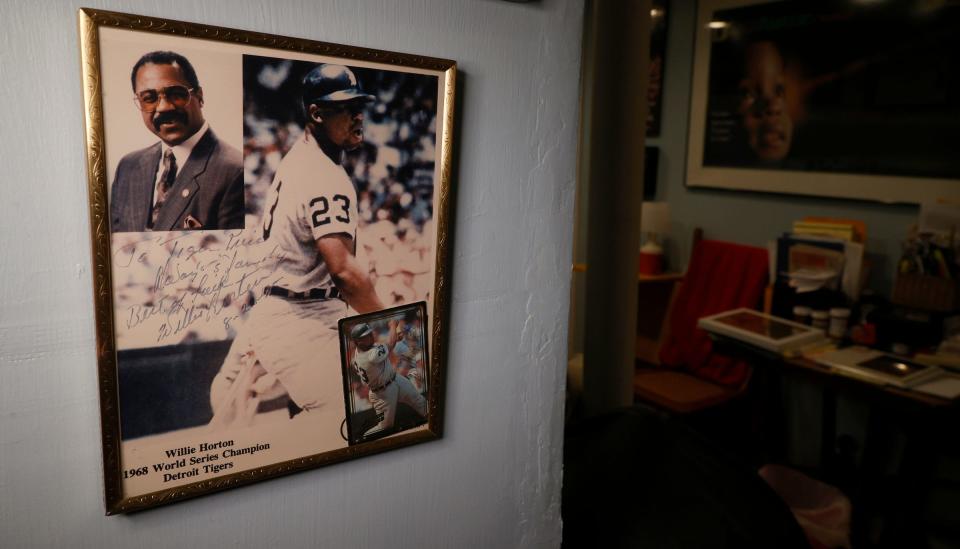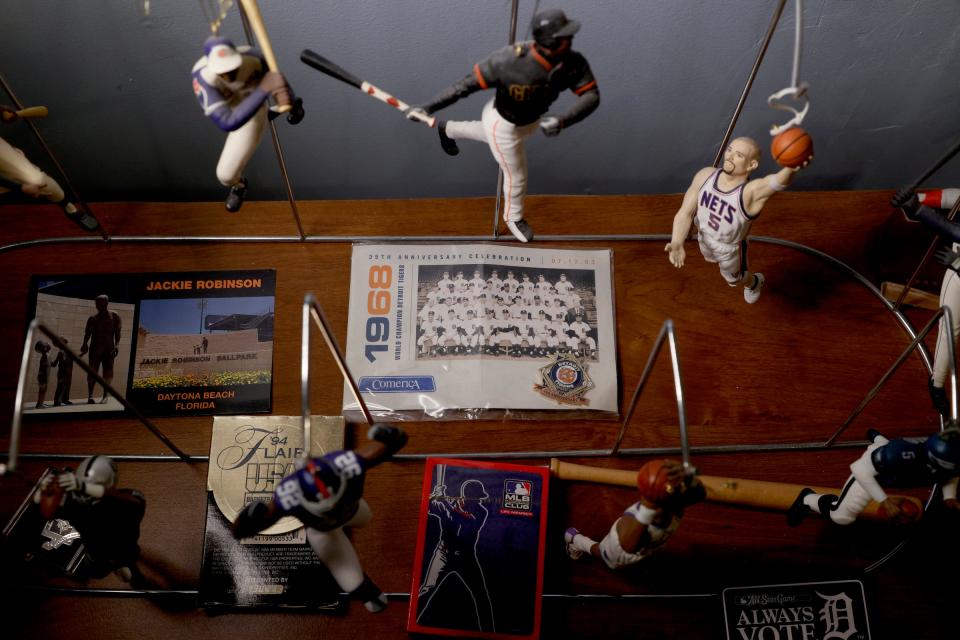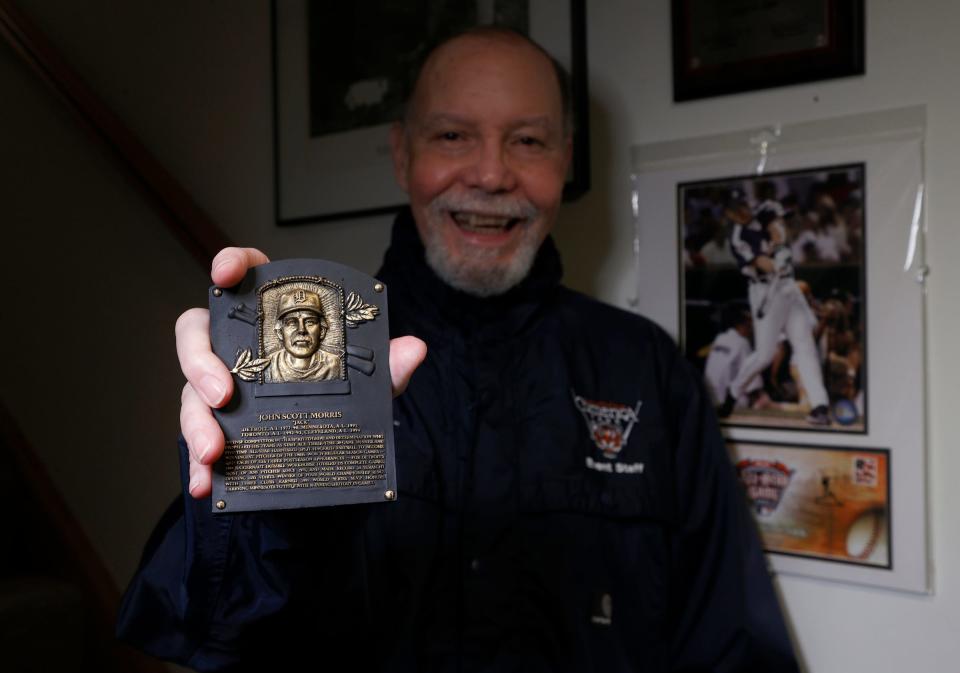Detroit man's 61-year connection to Tigers started with early Black players

- Oops!Something went wrong.Please try again later.
The year was 1967. The location was the baseball diamond at Mackenzie High School. And with one swing of the bat, Mike Price’s life would be changed forever with help from a Tigers baseball cap and a three-sport standout named Marvin Gurley.
“Marvin was a star on the baseball, football and basketball teams at Mackenzie. But that day, while wearing a Tigers baseball cap, I hit a triple off him during a practice,” recalled Price, who was a freshman at Mackenzie at the time. “The next time I came up, before he pitched to me, Marvin shouted to the fielders: ‘Back up guys, here comes Tiger!”
Gurley would go on to be selected by the Tigers in the 1967 Major League Baseball Amateur Draft. But 55 years later, the nickname he gave Price endures.
“Marvin’s girlfriend, Stephanie Robinson, who was on the Mackenzie cheer team and was one of the finest girls at our school, started calling me ‘Tiger,’ and I thought I was on top of the world,” Price, now 70, said proudly. “The significant thing was that I was wearing the Tigers cap because of Willie Horton. I was following Willie, who was putting his stamp on the Tigers as the team’s first Black superstar. And in 1967, wearing the Tigers uniform, he went out into the community, particularly on 12th Street, to try to quell the activities that were taking place during the insurrection. I loved the sport of baseball, but Willie Horton was someone I could identify with. And through him, I identified even more strongly with the name ‘Tiger’ and the team.”

There is no guarantee that the 2022 edition of the Tigers will create the type of excitement produced by the 1967 team, which chased the American League pennant all the way until the final game of the regular season, setting the table for a World Series title in 1968. However, Price says, he plans to follow the Tigers daily this season — from wire-to-wire — beginning with Friday’s Opening Day game at Comerica Park versus the Chicago White Sox. More than mere wins and losses, Price says he learned from his father, Ethridge, and his baseball coach at Mackenzie, Edward Silberstein, that every baseball season and game teaches life lessons. One of those lessons is the importance of perfect timing. And while the Tigers were one of the last Major League teams to integrate on the field, Price explained that the timing of the team’s eventual addition of key Black players was crucial to his now 61-year connection to the team.

More: Mitch Albom: Detroit Tigers' Opening Day may be the start of a rekindled love affair
More: Detroit Tigers finalize 2022 Opening Day roster. These 28 players made the team
“There was a quota system (for Black players) in Major League Baseball during the time I began following Willie Horton’s professional career,” Price said. “But at that same time we had Gates Brown, who came up to the Tigers the same year as Willie (1963) and a few seasons later the Tigers acquired Earl Wilson. And even before Willie Horton and Gates Brown, Billy Bruton and Jake Wood were on the team. To see those players in the lineup at that time was edifying.”
From those early Black players on the Tigers, Price said he learned the value of being fully prepared when opportunity calls, and the need to be accountable on and off the field.
“They were always prepared. For example, my father called Earl Wilson 'double duty,' because he was always good for 12 to 16 wins as a starting pitcher and six home runs a season,” Price said. “If we had pitchers today who could hit like Earl Wilson we wouldn’t need the designated hitter. But beyond what those players did on the field, they were responsible, well-thought-of members of our community. They embraced their positions as men — not as athletes, not as Black athletes — but men who lived in the community and were a part of it. Willie Horton would go around to Detroit playfields and he may not have had enough equipment for all the kids, but he was there for them — those Tigers were special!”
With a laugh, Price admits that he was anything but special when he had a chance to audition in front of a Tigers scout in 1970 at Butzel Field. He stepped up to the plate against an imposing hurler named Tommy Ford.
“He was a 6-2 lefty with an electric arm, and he struck me out on a series of breaking balls,” Price recalled. “I could hit a fastball, but I couldn’t do a thing with a breaking pitch.”
Instead of heading to a minor league baseball destination after graduating as class president of Mackenzie’s 1970 January class, Price headed to Ypsilanti and the campus of Eastern Michigan University, where he says the training and nurturing he received at Mackenzie served him well.
“I was very shy and I stuttered prior to coming to high school. But I had therapy, and afterwards I wanted to be on the radio,” said Price, who now speaks with a musical twang that some people mistake for an accent born in the South. “Fortunately, Mackenzie had a journalism program as well as a radio-speech program. So I started on MRU, Mackenzie Radio Unit, in Mr. (Ed) Ogul’s class. Mackenzie was a labor of love and it presented a foundation for me that I would not have had otherwise.”
More: The window is open for the Detroit Tigers. Why they must step through it right now
More: Detroit Tigers Opening Day: Where to eat, drink, and hang out to watch the game
Before Price even graduated from Eastern Michigan in 1976 with a bachelor’s degree in radio, television and film, he was on the radar of Warner-Electra-Atlantic Corporation because of his promotion of a concert featuring the Spinners and Natalie Cole during Price’s senior year at Eastern. He would go on to become WEA’s first Black advertising salesman in Michigan. Price says a successful six-year run with WEA was halted after the “bottom fell out of disco.” But a pink slip from WEA ultimately led Price to rosier days with Barden Cablevision, which also reconnected him with sports, including his beloved Tigers.
“We had an all-star team at Barden Cablevision,” said Price, who was an advertising executive and for 10 years co-hosted the hourlong “TV-6 Sportstalk” program, which also showcased the talents of the late Quentin King (co-host), the late Kevin Butler (director), high school correspondent and announcer Jeffrey Lowe and features reporter Stephanie Young. “The TV-set side, and going to the green room, was like the second coming of Motown Records because we worked with professionals that knew what it took to make people look good. They helped us develop our on-air demeanors and made us personalities. We all became polished as a result.”
Through studio and on-field interviews at home games, Price had an opportunity to be up close and personal with Tigers players and coaches, including Chet Lemon, Larry Herndon, Gates Brown, Vada Pinson and Cecil Fielder. Price also found a way to get in front of the legendary Sparky Anderson, who Price first met in 1979 as a member of a Free Press fan panel, which coincided with Anderson’s arrival as the Tigers’ manager.
“Sparky Anderson understood all of the nuances of the game, but he also knew how to talk to people,” Price said. “You might have been having a bad day trying to interview other people, but it was guaranteed that Sparky was always going to give you everything he had so that you could have a complete story.”
Price added another layer to his Detroit Tigers story when he became a Comerica Park Guest Services staff member in 2001. Like a baseball utility player, Price handled a variety of assignments. When asked to name some of his favorite moments on the job, Price quickly cited being the public address announcer for a high school all-star game honoring the Negro Leagues in 2005. He also recalled a special tour he guided at the ballpark.
“I once gave a tour to nine blind nuns," said Price, who was hired for the Guest Services position by Derrick Holmes, a retired Detroit Fire Department fire chief and fellow Mackenzie man. “I loved playing ambassador for the team. But from a personal service commitment, there was no greater experience on the job than giving that tour.”
Price’s 19-year run in Guest Services was ended by the COVID-19 pandemic, and his health and safety concerns have prevented him from coming back to a job that would bring him in contact with thousands of other people during each game.
“This is bigger than me and I cannot risk bringing COVID home to my wife,” Price said of his wife of 14 years, Ardith Arnelle'-Price. “I had a ball doing everything that I have done, but right now there is nothing more important than us taking care of each other.”
While removed from Comerica Park, Price made it clear Wednesday that he has been following the team daily, even before the season opener. Price says fans should feel good about the recent acquisition of Austin Meadows, a left-handed slugger who Price says is a perfect fit for Comerica Park. Price also is hopeful that Meadows’ presence in Detroit will help Meadows' brother, Parker, a Tigers prospect who has yet to live up to his second-round selection in the 2018 MLB Draft.
Baseball fans with Price’s fervor often use July as a checkpoint to determine whether their favorite team is going to have a successful season. However, he said this July will have special significance to him for another reason relating to the game he loves.
“On July 24, Bud Fowler (born John W. Jackson Jr. on March 16, 1858), co-founder of the Page Fence Giants, which was based in Adrian, will be inducted into the Baseball Hall of Fame,” Price said from his self described “man cave” in the basement of his home in Detroit’s Islandview neighborhood. “This is significant because the Page Fence Giants once won 82 games in a row and were one of the all-time great teams in early Black baseball.

“... This is about respect for everyone who has contributed to the game and respect for all humankind. When fans watch games this season, I hope they can appreciate all of the people right here in our city that have contributed to the game. People like Ron Teasley, one of the last remaining Negro Leaguers that also played college baseball. He batted .500 for Wayne (in 1945) and later had a tryout with the Brooklyn Dodgers, which led to him signing a contract. Because of the times, he spent much of his professional days in the Negro Leagues and Canada. But he passed down wisdom to the next generations, including many greats that played on the Northwestern High School field. ... Bud Fowler, Ron Teasley, these gentlemen bridged history and contributed so much to a game we all can enjoy. And it’s much more than a game to me — it’s spiritual. I say this as a lifelong baseball fan and as a man of God.”
Scott Talley is a native Detroiter, a proud product of Detroit Public Schools and lifelong lover of Detroit culture in all of its diverse forms. In his second tour with the Free Press, which he grew up reading as a child, he is excited and humbled to cover the city’s neighborhoods and the many interesting people who define its various communities. Contact him at: stalley@freepress.com or follow him on Twitter @STalleyfreep. Read more of Scott's stories at www.freep.com/mosaic/detroit-is/.
This article originally appeared on Detroit Free Press: Early Black Detroit Tigers players made Detroit man fan for life

